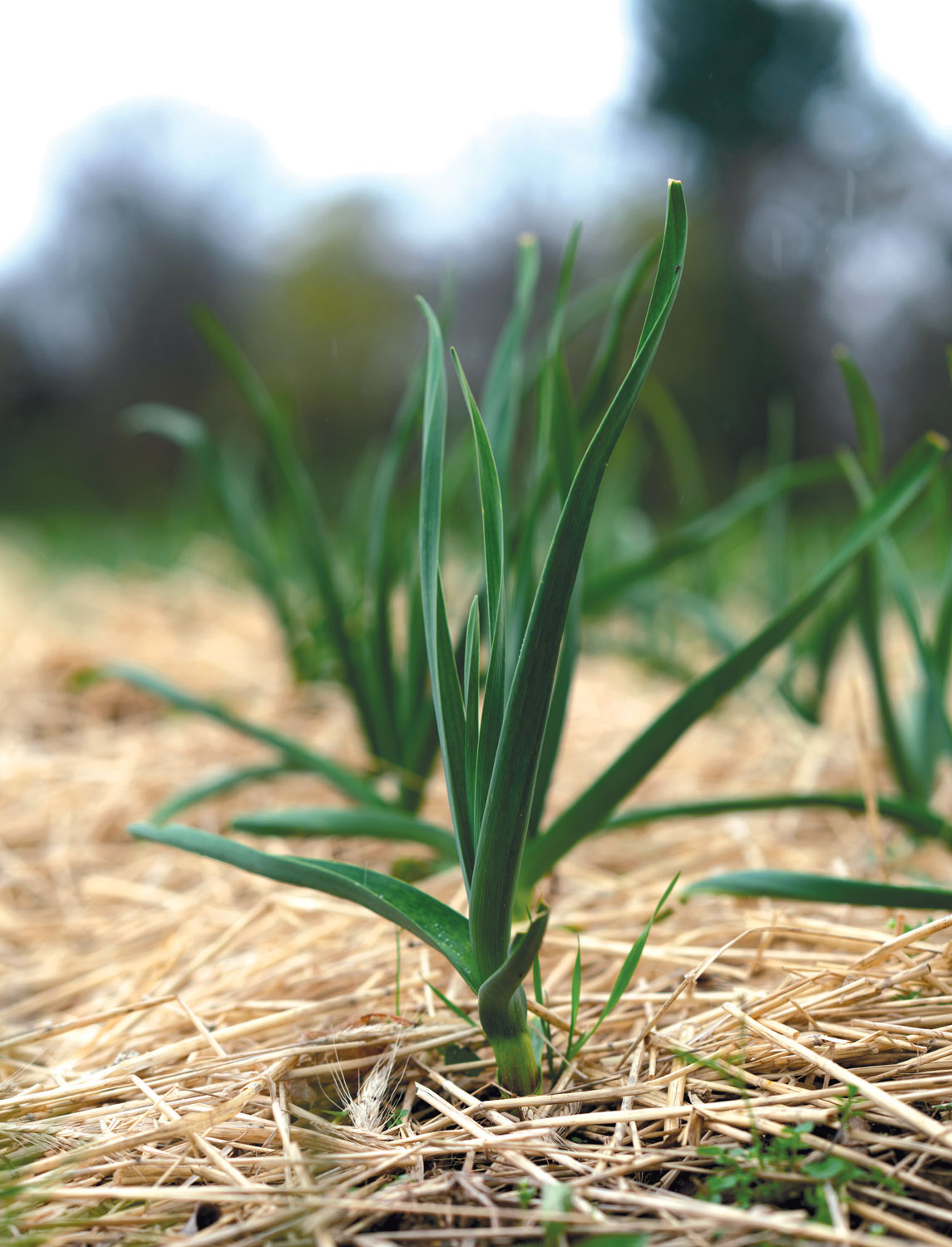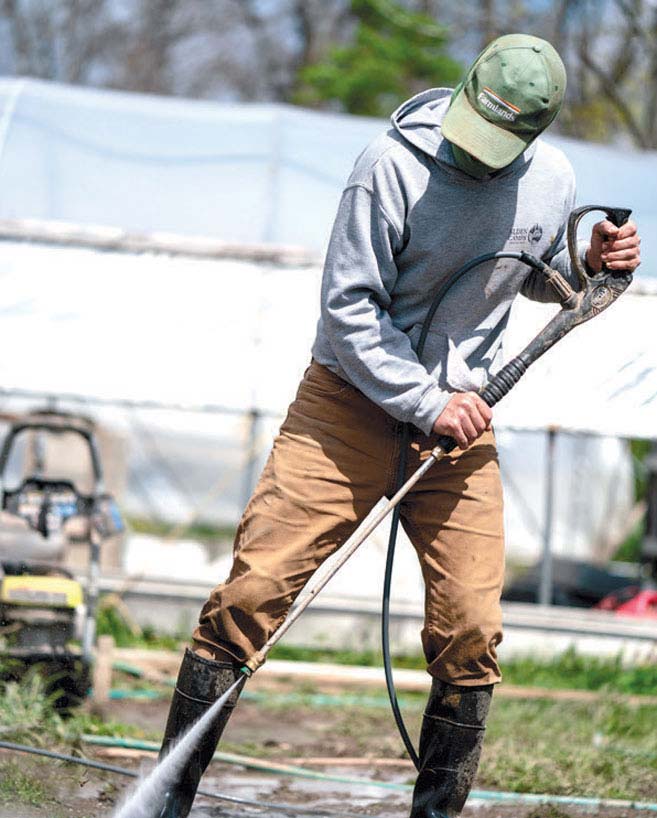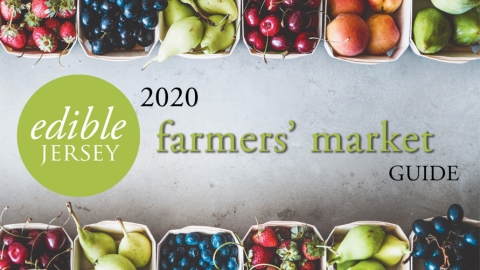Farming in the Age of Covid-19

Readers of Edible Jersey have long known that the state’s farms are essential businesses. In a densely populated state, we are fortunate to be supported by a diverse range of farms offering direct access to everything from just-picked produce to farmstead cheeses and fresh dairy.
Like no time in recent memory, farmers must think on their feet. Many of the state’s growers rely on sales to restaurants, schools and businesses that have closed or scaled back operations. Our farmers are also grappling with everything from the implications of social distancing on farmers’ markets to a swift uptake in demand as traditional grocery channels struggle to stock shelves. All the while, as distribution channels break down, farmers nationwide are dumping millions of gallons of milk and plowing under crops. The National Sustainable Agriculture Coalition forecasts an economic loss of $1.32 billion from March to May alone for farms and ranches serving local and regional markets.
IT’S TIME TO THINK HARD ABOUT WHY LOCAL FOOD MATTERS, AND TO INVEST IN THE KIND OF FOOD SYSTEM WE WISH TO CARRY FORWARD.
Innovation and resilience are qualities long associated with those called to feed their communities. As we talked with farmers statewide in the wake of COVID-19, those words came up again and again—and their effects are visible everywhere. Prior to farmers’ market season, restaurants like the Tortilla Press in Collingswood set up pop-up farmers’ markets, creating new sales channels for their farm partners (in this case, Vineland’s Flaim Farms). Farm-fresh distributors like Harvest Drop and Zone 7 rapidly pivoted to home delivery.
“Even though restaurants and schools make up the majority of our annual sales, I consider ourselves lucky that we have a diverse customer base,” says Zone 7’s Mikey Azzara, who partners with Just Farmed to deliver produce weekly in three counties. “Our strategy has been to think creatively and act quickly. The key element for us has been to lean into all of our relationships. Everybody is more willing than ever to help each other.”
Advocates are urging all of us to reiterate the value we place on local food. “With great pride, our family-owned farms produce some of the finest and freshest crops in the nation,” says New Jersey Secretary of Agriculture Doug Fisher. “If we are to continue to have farms in our midst in the Garden State, it is up to all of us to stand up and demand these crops come from the farmers we know and trust.” (See a complete statement from Secretary Fisher in the sidebar.)
Apron in place, it’s time to think hard about why local food matters, and to invest in the kind of food system we wish to carry forward. “We’re all cogs in this huge wheel, and whether it’s a pandemic or some other disaster, it’s easy for that wheel to grind to a halt,” says Carol Savoie of Savoie Organic Farm in Williamstown. “Everyone can do their part, whether it’s supporting local farms through CSAs or at farmers’ markets.” Here’s how six farms are pivoting right now.
MISTY MEADOW FARM
Finding Opportunity Amid the Dairy Crisis
— PETERSBURG, NJ —
As the Garden State’s shelter-in-place order changed the rhythm of life this spring, one of its stranger effects was a descending hush. Plane traffic slowed. Birdsong took on new prominence. Yet, quiet would not be the first adjective farmer Bill Simmerman would use to describe the barn at his 16-acre farm in Cape May County.
This April, Simmerman bred 60 East Friesian–Lacombe dairy ewes. The herd supports his fast-growing Grade A dairy and farm store—the first in South Jersey—though COVID-19 has complicated plans that have been coalescing since Misty Meadow broke ground three years ago. “We had a lot of dreams, and a lot of work later, I think we are there,” Simmerman says. “This was our big year, and then this thing comes along. But we’re adapting.”
Had things gone to plan, Simmerman would be ramping up agritourism, beginning with a sold-out spring lamb camp. He was also set to launch a frozen sheep’s milk yogurt bar dipped in Belgian chocolate, dubbed a Sheepsicle, in New York. “The distribution people aren’t taking on anything new until this thing goes by,” Simmerman says. So, he’s investigating how to leverage his cheesemaking facility to help offset a dairy crisis at a breaking point. Hard-hit farmers, including in neighboring states like Pennsylvania and New York, are dumping milk, with major sales outlets like schools and coffee shops closed.
Misty Meadow has the capacity to make 1,000 pounds of cheese a day. The challenge is red tape related to dairy transport. While he seeks a solution, he’s creating value from his home flock. “I’m not going to throw this milk in a trash heap,” he says. “I’ll make yogurt and give it to people who need it before I throw it into the trash. I could feed a lot of hungry people.”
At press time, Simmerman was implementing procedures to minimize exposure at his on-farm store, which has seen increased traffic. He was also working to launch an online market for his products— which include farm-grown non-GMO pork and lamb, yogurt, eggs and more—as well as those from other farms. The goal is to create a collective of vendors and reach locals in a new way, offsetting an anticipated dip in tourism-related farmers’ market sales. There’s a clear advantage to buying local online, he says: The food passes through fewer hands. “People can prepay. There [are] not going to be 30 people touching those people’s tomato or broccoli.”
Simmerman is also pivoting toward aged cheese, buying time. “There is an interesting thing about what I do: I can’t stop, no matter what,” he says. “These animals, you can’t shut them off.” Yet, despite the challenges, he remains optimistic. “All of the pieces are in place. I know we will get out to the other side, and I believe that small farmers will be stronger.”
In what is perhaps the most endearing shift, the farm is showcasing the antics of its sheep online. Response has been huge, Simmerman says. “People want more and more.” Follow the flock at facebook.com/iAlwaysWantedAfarm and mistymeadowsheepdairy.com.
SAVOIE ORGANIC FARM
Serving Suburb and City
— WILLIAMSTOWN, NJ —
As difficult as it has been to source groceries in New Jersey lately, the situation for our metropolitan neighbors is more tenuous. Barry and Carol Savoie have seen it firsthand. Throughout the COVID-19 crisis, they have continued to sell their organic produce at Union Square Market in Manhattan and Headhouse Square in Philly. Their takeaway: We are being called on to reexamine how we value the people who feed and clothe us.
“Because of the population density, most people don’t even have a car,” Barry says of their urban customers. “Farmers’ markets in New York and in Philadelphia are much more integral to how people actually get food.” As the spring weeks wore on—even amid measures that keep them socially distant—the overwhelming response from farmers’ market customers was one of gratitude. “I’ve got a [mask] on and they have to wear a mask, but they are thanking you constantly: ‘Thank you so much for being here. You don’t know how much this means to me.’”
During a challenging season, it’s a reminder of why they farm: to be of service to community. It’s also an opportunity to reflect on our food system. Most people recognize healthcare workers as essential, Barry says. Yet so are the folks picking lettuce and stocking grocery shelves. “These businesses are essential to the national security of this country. We should be putting a little bit more effort into raising their wages and treating them better.”
DURING A CHALLENGING SEASON, IT’S A REMINDER OF WHY THEY FARM: TO BE OF SERVICE TO COMMUNITY.
It’s a reality that weighs on the Savoies. Carol says she has heard from countless friends displaced from the hospitality business. “I wish I could hire them all, but I’m struggling to make sure we can pay the people we’ve already hired,” she says. At press time, that meant putting in their Payroll Protection Program application and hoping that the next wave of federal COVID relief includes farms. It also meant adjusting plans for a season in which the planting phase entailed normal investment, but the market months are defined by unknowns.
One solution is the return of their CSA, which the farm had discontinued last year in favor of farmers’ markets. Recognizing that customers are seeking a stable produce source, they will be distributing pre-filled, half-bushel shares at Haddon Culinary in Collingswood. Unlike a traditional CSA, they’re being sold in four-week increments, a move designed to simultaneously help folks with tight budgets and help the farm plan.
With the Collingswood Farmers’ Market reopened in drive-through format, the farm also launched an online store in which customers can prepay and schedule contact-free pick-up. While they worry sales will drop without the texture of browsing, they’re exploring all avenues. “It’s definitely a surreal and stressful time,” Carol says. “It’s a whole new ballgame. Yet, as a woman at Union Square Market said to us: ‘Times like these create opportunities for the best among us to come out.’ It’s an opportunity for people to shine and rise up.”
Find their latest offerings at savoieorganicfarm.com and savoieorganicfarm.myshopify.com.

CHERRY GROVE ORGANIC FARM
Holding Steady
— LAWRENCE TOWNSHIP, NJ —
When Cherry Grove Organic Farm was considering what to tell customers as COVID-19 cast its shadow this spring, a crop in their early fields served as a ready metaphor: garlic. “Underground all winter long, it has emerged,” they wrote on their website. “And each day, focused and steady, it continues to do what it needs to do to reach its ultimate goal. It is our goal this coming season to continue to provide the community with safe, nutritious, healthy food.”
Steadfast. Elemental. Garlic evokes how farmer Matt Conver is thinking about the 2020 season as a whole. In the face of numerous unknowns, his team is committed to maintaining a steady gait. Still, you don’t know what to expect this year, he says, noting that weekly farmers’ markets in Princeton, Scotch Plains and Summit normally account for 75% of the farm’s business. “Honestly, I expect to do three times the amount of work to make a third of the money,” he says. That’s not a matter of product, but of access. “We’ve been doing it long enough that I am confident about growing it. It’s how do you get it to people?”
Conver is confident that his markets will devise systems to keep them viable, if somewhat less lucrative. “The people who run the three markets that we attend are all smart people, and they are getting a lot of guidance from the government,” he says. To offset financial uncertainties—something he likens to a fog in the background—the 20-acre organic farm is accommodating a spike in CSA requests and plans to expand access to its farm stand.
Accordingly, on-farm social distancing measures have been put in place. This includes the obvious, he says (an investment in masks and gloves), along with expanded CSA pick-up hours and designated time slots for sensitive communities.
While the challenges are daunting, Conver draws on a quality he views as inherent to small businesses. “People are resilient. It’s not just farmers. It’s restaurants,” he reflects. “It’s amazing how people say, ‘Alright, this is what we have to do, and this is what we are going to do.’ People have adapted so quickly. Really, overnight. I am inspired by that.”
He is confident that the farm will weather the storm by remaining focused on its core mission: bringing local food to market. “We are all small farms in New Jersey, and you can get lost in the broader food distribution scheme. This has shown that there are a lot of options locally. We don’t have to go to a store to get this stuff. We can go right down the road.” Find the latest farm stand and market hours at cherrygroveorganic.com.
CHERRY GROVE FARM
Introducing Local Delivery
— LAWRENCEVILLE, NJ —
Amid a mad dash for grocery delivery and curbside service this spring, the pressure on major chains to meet customer demand was fierce. Yet, with a spark of ingenuity, alternate grocery sources began to emerge in an unexpected place: the farm stand.
“When we were shopping for ourselves outside of the farm, we saw that people were running out of things left and right,” says Joselyn Preston, retail marketing manager for Cherry Grove Farm, a sustainable dairy in Lawrenceville known for its award-winning cheeses. So, they hatched a plan.
It started with a major sale focused on proteins, all raised on the farm. From there, a delivery program was launched. “We have quite a few regular customers that are older or have small children and are not able to get to us at this time,” Preston says. In an all-hands- on-deck effort, text-based orders of $60 or more were soon being transported within 30 minutes of the farm. It has been a huge group effort. “We have all taken on roles we are not used to, and all share the load. Everybody has been pitching in, which is nice to see amidst all of this chaos.”
Even head cheesemaker Paul Lawler now spends time on the road. Given the strength of the farm’s cheese program—Havilah, an Alpine- style raw milk cheese, just landed a 2020 Good Food Award— that time investment reveals how important it is for farms to adapt to shifting circumstances. With wholesale orders down, the sales equation has shifted. The upside is an ability to change gears quickly and focus on what customers need in the moment, Preston says.
In addition to delivery, the farm added curbside pickup and will continue to participate in farmers’ markets. Farm store hours have also been extended to seven days a week, with an infusion of shelf-stable items. “We usually carry local products,” Preston says. Now, they are offering in-demand items from flour to beans and dried fruit. Simultaneously managing three new retail methods is challenging, she admits. Yet, the hope is that serving as a “little-bit-of-everything grocery store” will help customers make fewer shopping trips.
So far, the feedback has made that pivot gratifying, Preston says. “People are just happy to be able to get product because things are so hard to come by,” she says. She is hopeful that this period will ultimately bolster the local food system. “It brought us back to a massive sense of community,” she says. “You get in the habit of going to a certain store or going to a certain place. When something like this happens, it makes you step back and look at what’s possible. I hope it opens people’s eyes to where their food comes from.”
In addition to the outlets above, Cherry Grove Farm sells its cheeses online, at community farmers’ markets and through selected retailers. See what’s in store at cherrygrovefarm.com.
“WE HAVE ALL TAKEN ON ROLES WE ARE NOT USED TO, AND ALL SHARE THE LOAD. EVERYBODY HAS BEEN PITCHING IN, WHICH IS NICE TO SEE AMIDST ALL OF THIS CHAOS.”
—Joselyn Preston
DREYER FARMS
Becoming a Go-To Local Grocery Store
— CRANFORD, NJ —
When we think about supply chains, the human impact of COVID-19’s alteration of the food system can be obscured—especially when it comes to those working tirelessly to feed people. Weeks into a rapid shift in her 116-year-old farm’s normal way of doing business, however, thinking about what her team has experienced stops Jessica Dreyer in her tracks.
“We open up in the middle of March,” she says. “Normally, everybody is happy to be back. The feeling is that winter is over.” This year, the context couldn’t have differed more. With people just starting to shelter in place, opening weekend was intense. “We were buying all of this produce and trying to figure out what we were going to do as far as serving the community. It’s one thing to see it on TV. Three or four days in, we realized there was a much bigger need.”
Normally, spring sales center on St. Patrick’s Day donuts and pansies grown in the farm’s expansive greenhouses. Come April, they give way to the season’s first asparagus. “We grow all of our own vegetable plants,” Dreyer says. Recognizing day-to-day realities, the farm pivoted, bringing in produce from distributors while the Jersey season ramped up. Customers came in droves, drawn by a curbside offering that quickly tested the limits of the team.
They did it for 10 days, Dreyer says. With 300 orders coming in daily, however, the team hit its limit. “Normally, we have a rolling payroll of 30 people that come in and out, including high school and college kids and full-time employees. Now, we’re down to about seven.” To meet demand, Dreyer plans to ramp up her CSA program, and has also been serving as a gardening resource for new growers who come to the farm seeking plant starters.
In 2020, CSAs are in high demand. “People want to secure safe, local produce throughout the summer, and they want to sign up for it. They also want to prepay so they don’t have to worry about it,” Dreyer says. In some ways, she views growing awareness of local food as a silver lining for farmers. “For a lot of people, maybe local had been kind of a buzzword. All of the sudden, people are like, ‘Hmm. Wait a minute here.’”
That said, meeting the need has its challenges. “I feel good that we can provide work, and everyone is so supportive, but it’s a lot of pressure,” Dreyer says. “It is a very emotional time for a lot of people. I guess for me, too, but I’m happy to do it.” Yet, when the sun is out and the breeze is moving, her open-air setting has a certain sense of lightness. It also brings an advantage when it comes to social distancing, Dreyer says.
Ultimately, she is cautiously optimistic that a change in shopping habits may help farms like hers in the long run. “Not only do we have more customers, but they are buying so much more. They like the convenience, and they are recognizing that this stuff is just better.” If they follow her through the season, Dreyer says, that difference will only grow clearer. Besides, if there was ever a time to stick together, it’s now. “We’re in the community. My kids go to school with your kids. We are all in this together.” See what’s in store at dreyerfarms.com.
FLOCKTOWN FARM
Finding Stability in Community
— PITTSTOWN, NJ —
During times of uncertainty, holding true to one’s values can illuminate a path forward. For farmer Noah Thomases, COVID-19 has reinforced the principles that underscore his impulse to grow food in and for community. It also highlights longstanding fissures in the foundation of our global food system. Complacency, he says, has allowed us to imagine that issues such as climate change and pandemics were problems for a distant future. “But the future is here, and we need more than ideals,” he says. “It’s clear, now more than ever, that local, organic and sustainable agriculture is more than a principle. It’s an integral part of our resiliency plan.”
A membership-based farm, Flocktown entered late spring with a rapidly expanding wait list after an early sell-out for its home delivery service that reaches Central and North Jersey. “We are committed 100% to our members and our community,” Thomases explains. All of the fruits and vegetables are grown at the certified organic farm, with add-ons from bread and eggs to cheese and mushrooms sourced from like-minded producers.
With the onset of COVID-19, Flocktown has added staples like organic beans to the mix. They’re going to homes anyway, and people are trying to find things that are in short supply, Thomases says. While meeting that need, he’s committed to maintaining the integrity of Flocktown’s core offerings, which position it to serve its loyal community well during a crisis.
Alongside these member-focused efforts, the farm is equally focused on measures to protect the team, many of whom live on site. Given the farm’s model, the team does not need to interact in wholesale or farmers’ markets, Thomases says. As a membership organization, they have more control over their environment, he adds, noting that they have stocked up on additional delivery boxes that will be quarantined on return.
In a major move, Flocktown has also extended employer-based health plans to its staff. “Healthcare is something that is considered out of reach for a lot of farms, and also something that a lot of farms aspire to be able to do,” he says. “I’m very proud that our community of members and employees has helped us grow to this point where that’s something that we can offer.” It’s a significant investment at a moment when vision is required to foster food system resiliency for workers and eaters alike.
“It’s time to get serious about how we’re going to build a real future where people have food,” Thomases says. “I hope that, as we collectively reevaluate the things that we took for granted, . . . we also rethink our relationship to food and community and examine our reliance on cheap, fragile global supply chains for our basic survival.” That doesn’t mean losing our identity as global citizens, he notes. Rather, it’s about rebalancing priorities. “That old maxim, ‘think globally, act locally’ has never seemed more relevant.”
Connect with Flocktown online at flocktownfarm.com.
WHAT'S NEXT?
How will farms and distributors adjust? New Jersey’s Zone 7 has been working with Dan Barber of Blue Hill Stone Barns in New York to help assess the ripple effects nationwide of an unprecedented market disruption. In many ways, says Mikey Azzara of Zone 7, it’s time for a local food system long in the making to serve its true purpose.
IF WE ARE TO CONTINUE TO HAVE FARMS IN OUR MIDST IN THE GARDEN STATE, IT IS UP TO ALL OF US TO STAND UP AND DEMAND THESE CROPS COME FROM THE FARMERS WE KNOW AND TRUST.
MESSAGE FROM
New Jersey Secretary of Agriculture Douglas H. Fisher
New Jersey farmers are in the field right now, harvesting some crops and planting others. They work hard, with the hopeful expectation that they will find a market and get a fair price. With great pride, our family-owned farms produce some of the finest and freshest crops in the nation.
Over the years, there has been a trend for fruits and vegetables to travel to our tables from around the globe and from thousands of miles away within our own country. At the same time, consumers, over and over again, say they are much more desirous of local product. Some operators even attempt to make product appear more “local” than it really is, for the exact purpose of addressing that consumer demand.
If we are to continue to have farms in our midst in the Garden State, it is up to all of us to stand up and demand these crops come from the farmers we know and trust. If not, soon we will be looking outside our state’s borders for the majority of our agricultural products, wondering how we became so dependent on outside supply when we had it growing right here in-season.
With the resulting closing or scaled-back operations of many of the excellent restaurants [that] have committed themselves to sourcing product from our farmers, the COVID-19 pandemic drove home how much we, as consumers, miss those eateries that put a premium on fresh, locally sourced ingredients.
We look forward to those restaurants operating at full strength once again when we return to “normal.” But, in the meantime, we can still avail ourselves of all the high-quality, delicious, farm-fresh items our farmers are producing. We just need to cook them up ourselves for the time being. Many great recipes using Jersey Fresh items can be found on the Department’s “Find Jersey Fresh” web page at findjerseyfresh.com/recipes.






